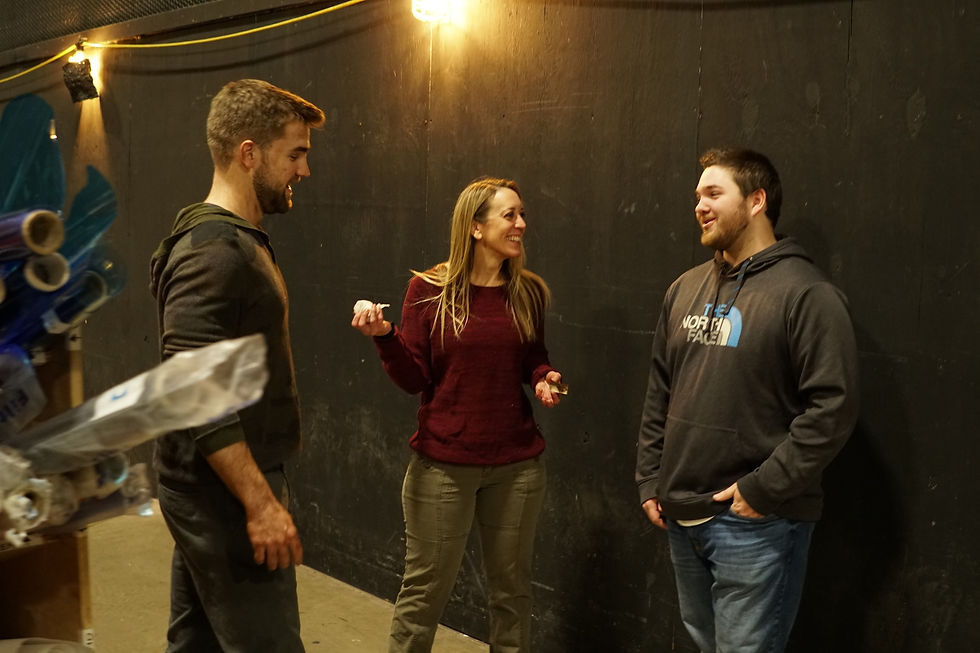Mailman: A Sci-Fi and Action-Adventure Film
- Jan 6, 2021
- 5 min read
The Mailman is a sci-fi and action-adventure film about an undercover agent named Mars sent to recover a high-value "package" stolen by rebels. Set in a dystopian world where revolutionaries must steal to survive, the government, known as the Citadel, deploys special agents called Mailmen to maintain order. As his mission plays out, Mars must decide whether to follow his orders or conscience. When he does, things change.
Matt Hourigan is an independent American film director, screenwriter, and producer. A San Francisco Bay Area native, he is currently a junior studying to earn his B.F.A. in Film and Television from the School of Cinematic Arts at DePaul University in Chicago, Illinois.
Influenced by the film greats Martin Scorsese, Quentin Tarantino, George Lucas, and his own life experiences, Matt's passion is to bring his own bold style of creative development to the digital screen.
After working on several college course related shorts, this film is Matt’s directorial debut. Upon graduation, he plans to move to Southern California. His main career goal is to direct a feature film for a major production company.
It was our pleasure to interview Matt Hourigan.

What draws you to filmmaking and the cinematic language?
I love to tell stories and how filmmaking allows the creative freedom to combine language, images, and sound to tell those stories in a way that connects with audiences in a very meaningful way. With an active imagination and today’s modern digital tools, there is almost no limit to the types of stories you can tell.
I also really enjoy the creative development process, collaborating with others and the sense of accomplishment from making something entirely new. Filmmaking is a team sport. It is bigger than what one person can achieve working alone and therefore much more satisfying to play.

Do you believe in film schools or does making a film teach you more than film school?
I think both film school and hands-on experience are super valuable. From my own experience, I am a 100% believer in film school for four reasons. First, learning from others’ experiences and instructors who genuinely want to help you succeed, can only benefit and accelerate your career. Second, at a school like DePaul University, you are provided access to state of the art equipment and sound stages that otherwise would not be as easily available. Third, practicing your craft in a forgiving academic environment allows you to succeed and fail gracefully before making your work more public. Fourth, it gives you the opportunity to quickly develop a network of like-minded, talented, and specialized filmmakers to continue to work with after graduation.
I also agree experience is the best teacher. You cannot just read about making films, you need to do it over and over to really learn the process and hone your skills (just like any endeavor). Getting better requires hands-on practice and experimentation.
What makes cinema stand out more than the arts for you?
While I love the arts for what each has to offer, cinematic ‘visual storytelling’ seeks to combine and build on the best of other art forms (great written stories, images, music, sounds) to connect even more deeply with audiences. There is a lot to get right and plenty that can go wrong but when all the elements come together well, cinema moves you often more than any one art form on its own.

Did you choose a certain directing style for making "The Mailman" based on the script?
As a DePaul University student with access to a professional sound stage and equipment, I challenged myself to take advantage of the opportunity and do something big! Consequently, I wrote and directed “The Mailman” with the sound stage I planned to use and a micro-budget limit in mind. To help stay on-budget, I planned all aspects of the production in advance as much as I could. That helped me make wise pre-production decisions to make the most of the resources available to me. My directing goal was to make sure everyone on set knew what we were going for so they could be as well-prepared as possible. Thanks to my amazing cast and crew, I am happy to say production did go mostly as planned and I am incredibly happy with the result.

How did you choose the cast and the crew of your film?
I did an online casting call to the Chicago area and was able to find excellent actors to bring each character to life. My awesome crew were mostly DePaul University classmates. I was truly fortunate to work with such a collaborative and talented group. Based on their feedback, I think the whole project experience was extremely rewarding and fun for everyone.
How did you fund your film and what were some of the challenges of making this film?
This was my first personal project and I self-funded it from my previous employment experience. Hence, the micro-budget limitation.
There were a few key production challenges. The first was to create a believable futuristic sci-fi world with fantastical elements on an ultra-micro budget. To achieve it, we had to be creative with the lights, special effects, costumes, and props. Another was how best to utilize the available set. We tried to use pretty much every area and angle to make it more interesting. Lastly, we had to manage through multiple COVID-19 related post production complications and delays (which limited our access to key equipment).

Do you consider yourself an indie filmmaker and what would be the most difficult thing about being an independent artist?
As a current film student, I am not sure where my future career path will take me. I can envision multiple potential scenarios. For the foreseeable future, I will continue to independently write, direct, and produce the short film projects I have in mind. Based on their success, my longer-term plan is to secure funding for my planned feature projects. I expect securing the funding to match my high aspirations will be the biggest ongoing challenge. There are so many great stories I want to tell.
What is the distribution plan for your film
After its festival run, I plan to distribute The Mailman online.
What is your cinematic goal in life and what would you like to achieve as a filmmaker?
My cinematic goal is to make films that are fun to watch. I really like sci-fi and action-adventure stories, but I plan to explore other genres too.
Great films challenge my thinking and motivate me to be a better person. I want my audience to have the same experience. Thematically I seek to tell positive and inspiring stories about characters with heroic qualities worth emulating (like the main character Mars in The Mailman). Moreover, I want to tell stories that unite us and highlight the amazing things groups of people can do when they work together. I think our world needs that recurring reminder.
What kind of impact would your film have in the world and who is your audience?
I think The Mailman delivers a positive and empowering “do the right thing” message in an entertaining way to its target audience of fun-loving sci-fi and action-adventure fans. As such, I hope it inspires them to make good decisions in their lives.




Comments